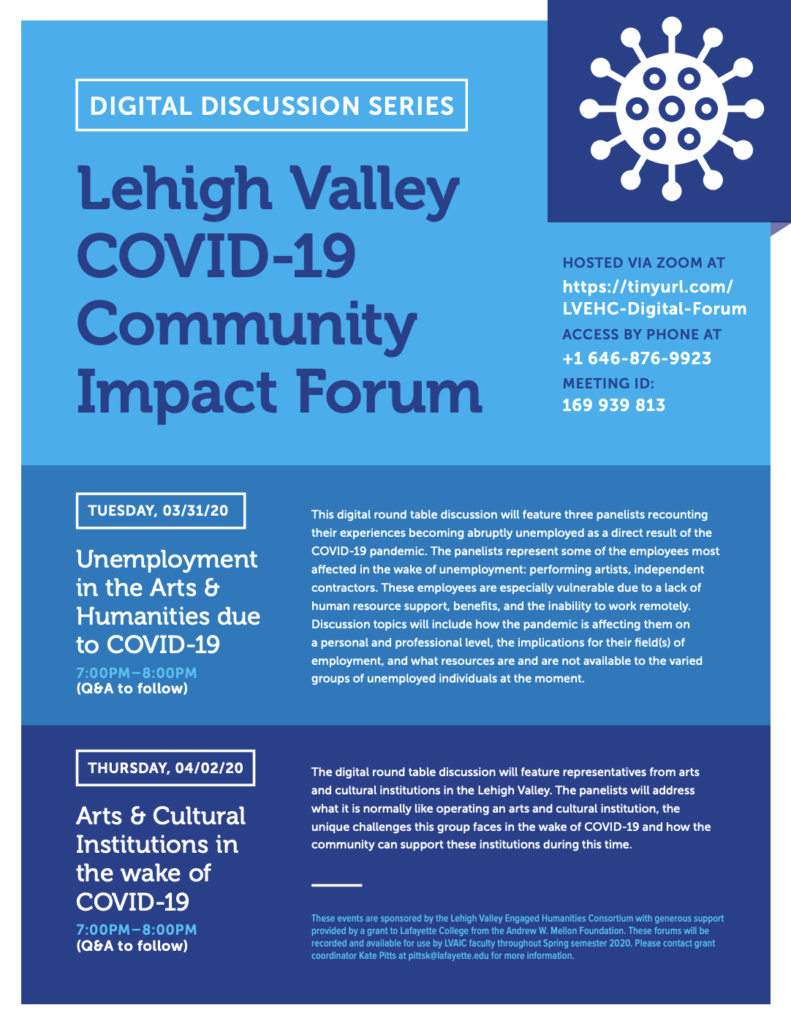COVID-19 Community Impact Forum highlights unemployment in the arts and humanities
By Shannon Sigafoos
The Lehigh Valley Engaged Humanities Consortium, with generous support provided by a grant to Lafayette College from the Andrew W. Mellon Foundation, hosted its first Lehigh Valley COVID-19 Community Impact Forum on Tuesday evening. Panelists represented locals most affected in the wake of unemployment: performing artists, restaurant workers, and independent contractors.
The forum was recorded for oral history archival material for the Sigal Museum, and Lehigh Valley faculty who incorporate LVEHC-sponsored digital content into their coursework are eligible for a $375 course enhancement stipend. Access to the recording can be requested at tinyurl.com/LVEHC-Access.
“We’re in the third year of a grant that funds public events, course development, building digital collections, and artist collaborations. The main themes are diversity of communities in the Lehigh Valley in the past 50 years, the changing nature of work and sense of place—underpinned by the process of story making. So, all of these things were hyper relevant to the current situation that everyone finds themselves in,” explains Kate Pitts, Lafayette’s LVEHC Mellon Grant coordinator.

“There are a lot of people who have found themselves unemployed and a lot of institutions who found themselves without income that they rely on. We wanted to give a voice to that while also being able to give them stipends for participating. Our biggest hurdle was fast-tracking the normal process while everyone was working remotely, but the panelists got onboard very quickly.”
Those panelists included Alyssa Lou Allen (musician, teaching artist at Touchstone Theater, puppeteer at Book & Puppet, and server at Porter’s Pub in Easton), Carly Comando (touring musician and server at Roasted in Bethlehem), and Steve Bost (comedian, actor, and server at Fegley’s BrewWorks).
“Everything just fell off the calendar,” says Lou Allen, who had events canceled at all of her workplaces, as well as a summer tour canceled with a band she’s just started playing with. “It’s a lot of money just flying out the window. I’m lucky that I can also work remotely doing copywriting and design, but that is a fraction of my income. It’s maybe a fourth to a fifth of my income, and the rest of it is doing everything else. So, I’m taking a big loss here and trying to find the good stuff where I can.”
“I went into this with optimism about the restaurant industry. I guess I was deluding myself a little bit because it appeared to me like an extended snow day. I thought restaurants and bars would remain open because everyone would just come out to them because they weren’t working anymore,” relates Bost. “Then I learned how fragile all of my jobs are, because like the other panelists, they fell like dominoes.”
Employees in these types of fields are especially vulnerable due to lack of human resources support or benefits. Like other workers across many industries, it has forced these panelists to confront the fragility of the types of the careers in which they’ve chosen to make a living.
“I feel like being a performer, we’re very creative people, and we do our best to find a solution to the tasks at hand. But everything just happened all at once,” says Comando. “That first week, I didn’t have the innate reaction to go and create anything. If anything, it was the opposite. I just needed to process this trauma and this grief of realizing how hard it was going to be to move forward.”
To be able to document what’s happening to the workforce in the present moment is what’s important about recording these oral histories. COVID-19 has created a rapidly changing, unprecedented health and economic crisis around the world, but technology has created a way for capturing and sharing those changes as they take place.
“We’ve worked on a lot of oral histories and looking at change over the past 50 years, and we recognized the unique position that we were in to be able to document what’s happening in real time,” says Pitts.
A second forum taking place April 2, “Arts & Cultural Institutions in the wake of COVID-19,” also will be available through LVEHC.
